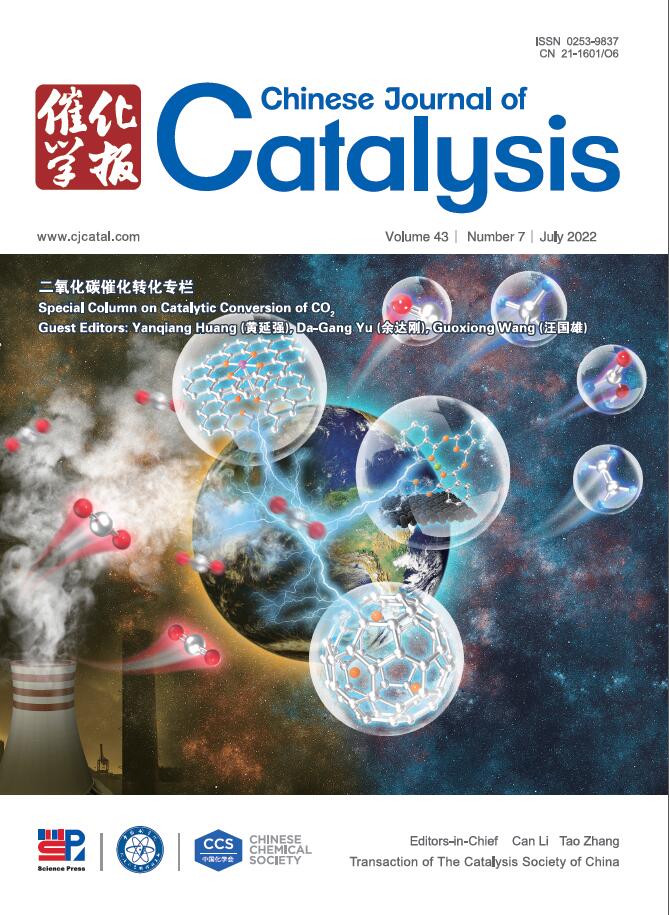Unsaturated cobalt single-atoms stabilized by silanol nests of zeolites for efficient propane dehydrogenation
IF 17.7
1区 化学
Q1 CHEMISTRY, APPLIED
引用次数: 0
Abstract
Propane dehydrogenation (PDH) has emerged as a key on-purpose technology for the production of propylene, but it often depends on toxic chromium and expensive platinum catalysts, highlighting the need for environmentally friendly and cost-effective alternatives. In this study, we developed a facile impregnation method to fabricate unsaturated Co single-atoms with a tricoordinated Co1O3Hx structure by regulating silanol nests in purely siliceous Beta zeolites. Detailed PDH catalytic tests and characterizations revealed a positive correlation between the presence of silanol nests and enhanced catalytic activity. Additionally, the unsaturated Co single-atoms exhibited a carbon deposition rate more than an order of magnitude slower than that of Co nanoparticles. Notably, the optimized Co0.3%/deAl-meso-Beta catalyst achieved a record-high propylene formation rate of 21.2 mmolC3H6 gcat–1 h–1, with an exceptional propylene selectivity of 99.1% at 550 °C. Moreover, the Co0.3%/deAl-meso-Beta catalyst demonstrated excellent stability, with negligible deactivation after 5 consecutive regeneration cycles. This study emphasizes the pivotal role of silanol nests of zeolites in stabilizing and modulating the coordination environment of metallic active sites, providing valuable insights for the design of high-activity, high-stability, and low-cost PDH catalysts.
沸石硅醇巢稳定不饱和钴单原子用于丙烷的高效脱氢
丙烷脱氢(PDH)已成为生产丙烯的关键技术,但它通常依赖于有毒的铬和昂贵的铂催化剂,这突出了对环保和成本效益替代品的需求。在这项研究中,我们开发了一种简单的浸渍方法,通过调节纯硅质β沸石中的硅醇巢来制备具有三配位co103hx结构的不饱和Co单原子。详细的PDH催化试验和表征揭示了硅烷醇巢的存在与催化活性增强之间的正相关。此外,不饱和Co单原子的碳沉积速率比Co纳米颗粒慢一个数量级以上。值得注意的是,优化后的Co0.3%/ al -meso- beta催化剂的丙烯生成率达到了创纪录的21.2 mmolC3H6 gcat-1 h-1,在550℃时丙烯选择性达到了99.1%。此外,Co0.3%/ al -meso- beta催化剂表现出优异的稳定性,在连续5次再生循环后失活可以忽略不计。该研究强调了沸石硅醇巢在稳定和调节金属活性位点配位环境中的关键作用,为设计高活性、高稳定性和低成本的PDH催化剂提供了有价值的见解。
本文章由计算机程序翻译,如有差异,请以英文原文为准。
求助全文
约1分钟内获得全文
求助全文
来源期刊

Chinese Journal of Catalysis
工程技术-工程:化工
CiteScore
25.80
自引率
10.30%
发文量
235
审稿时长
1.2 months
期刊介绍:
The journal covers a broad scope, encompassing new trends in catalysis for applications in energy production, environmental protection, and the preparation of materials, petroleum chemicals, and fine chemicals. It explores the scientific foundation for preparing and activating catalysts of commercial interest, emphasizing representative models.The focus includes spectroscopic methods for structural characterization, especially in situ techniques, as well as new theoretical methods with practical impact in catalysis and catalytic reactions.The journal delves into the relationship between homogeneous and heterogeneous catalysis and includes theoretical studies on the structure and reactivity of catalysts.Additionally, contributions on photocatalysis, biocatalysis, surface science, and catalysis-related chemical kinetics are welcomed.
 求助内容:
求助内容: 应助结果提醒方式:
应助结果提醒方式:


